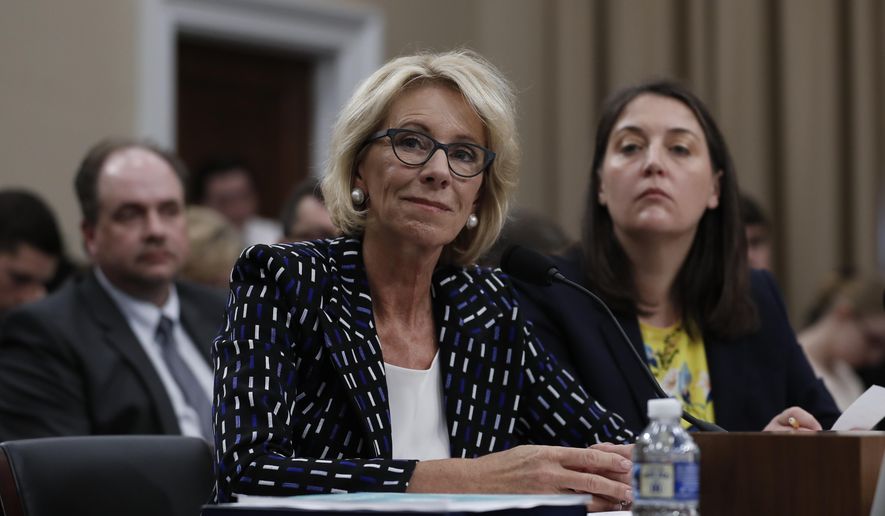A House Democrat denounced her budget proposal as “cruel” and “heartless,” but Education Secretary Betsy DeVos stood her ground at Wednesday’s hearing, arguing that students would be better served by innovative school choice programs than more federal spending.
Exhibit A was the Obama administration, which for years poured money into federal education grants without moving the needle on student achievement.
“In fact, the last administration invested $7 billion in school-improvement grants specifically targeted at the lowest-performing schools and areas with zero results and zero improvement,” Ms. DeVos told the House Appropriations education subcommittee.
“We have tried that,” she said. “I think it’s time to try something different.”
Even so, Democrats came out swinging against the administration’s education budget, which cuts $9.2 billion, or 13 percent, from the department while earmarking $1 billion for states and school districts that voluntarily adopt school choice programs.
“It is cruel, it is inhumane, and it is heartless — a $9.2 billion cut to education,” said Rep. Rosa L. DeLauro, Connecticut Democrat, adding that she would “fight this budget, Mr. Chairman, with every fiber of my body.”
Ms. DeVos countered by describing the proposal as consistent with President Trump’s promise to return authority over education policy from the federal government to states, school districts and parents.
She said the budget request would “eliminate or phase out 22 programs that are duplicative, ineffective or are better supported through state, local or philanthropic efforts,” which includes federal funding for Special Olympics.
Accused by Democrats of trying to shift funding from public to private schools, Ms. Devos replied, “We’re talking about students and their education.”
“I think we spend a lot of time talking instead about schools and buildings and systems,” she said. “I think we should be focused on doing what’s right for individual students. If a school’s not working for a student and a parent doesn’t have the economic means to do something different, I think we should help find them ways to be able to make that decision on behalf of their students.”
Democrats advocated for more federal dollars. Rep. Lucille Roybal-Allard of California said that “perhaps a better way … in these poor minority schools would be to invest more,” while Rep. Nita M. Lowey of New York said that “we need to increase the resources.”
“Remember, the federal government just provides about 9 percent of resources for public schools, [and] most of it comes from state and local taxes,” said Ms. Lowey. “So what we have to do is increase resources for public schools, not put an increased burden on the state and local, and, again, continue to work together to improve them, not diminish them.”
Republicans, meanwhile, cheered the administration’s move toward greater school choice and fiscal responsibility.
Rep. Andy Harris called for more competition and bemoaned the low rankings of U.S. students in international assessments.
“I think there is no question that we don’t get a bang for our buck in the American educational system,” the Maryland Republican said. “Because we see education spending going up, we think, I guess, the measure on how effective education is how much money you spend on it, and yet on all these objective tests, we are failing in a global education economy.”
Rep. Katherine M. Clark, Massachusetts Democrat, grilled Ms. DeVos on whether the federal government would step in if private schools in school choice programs were found to deny admissions based on sexual orientation and gender identity, citing a Christian school in Indiana.
“Is there a line for you on state flexibility?” Ms. Clark said.
Ms. DeVos replied, “I think the Office of Civil Rights and our Title IX protections are broadly applicable across the board.”
There was disagreement about funding for historically black colleges and universities, which Ms. DeVos described as unchanged. Rep. Barbara Lee, California Democrat, said the allocation had been reduced because it failed to include $7.5 million for master’s programs.
Subcommittee Chairman Tom Cole, Arkansas Republican, said the administration had been working from the 2017 continuing resolution, not the omnibus appropriations bill approved earlier this month, which resulted in “overlapping documents.”
“We were pretty late in getting our omnibus done,” Mr. Cole said, adding that, “In fairness to the secretary, they didn’t have that information, and they did not know Congress had authorized that program at the time they were putting together their budget. It puts her in a difficult spot here.”
Rep. Steve Womack, Arkansas Republican, said that the “inescapable fact is that many of the programs we’re talking about here are on the discretionary side of the budget.”
“We are beginning to see the early stages of a much-needed robust discussion about how we begin the process of getting our federal budget under control,” Mr. Womack said.
• Valerie Richardson can be reached at vrichardson@washingtontimes.com.




Please read our comment policy before commenting.